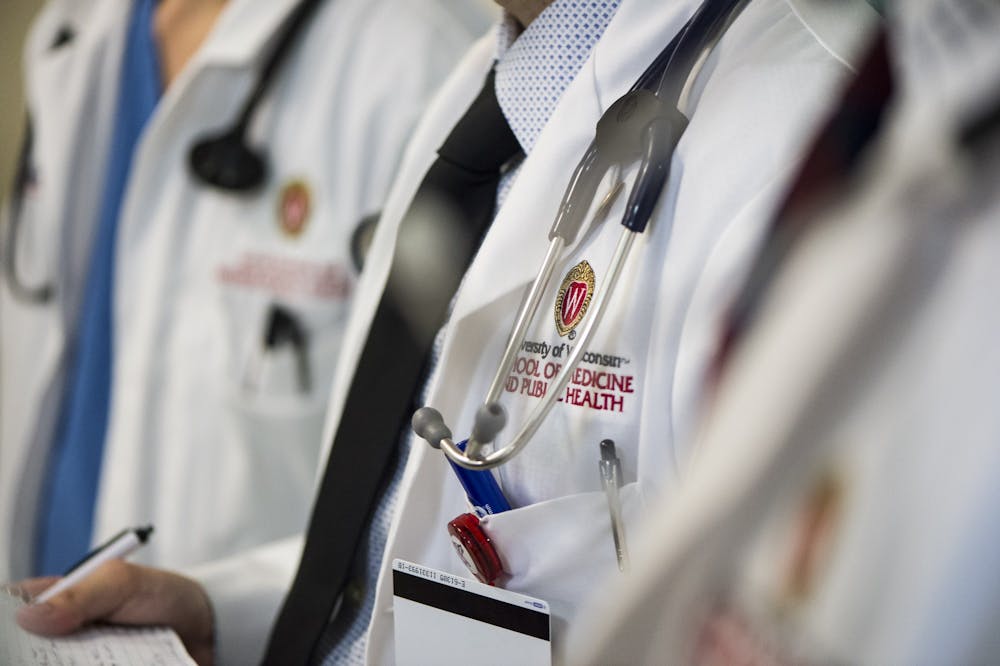Abby Jacobson knows exactly how tough it is to treat patients when COVID-19 cases skyrocket.
As a float nurse at Aspirus Riverview Hospital in Wisconsin Rapids, she and her colleagues in the ICU struggle to manage their stress as they care for severely ill patients.
“The last couple of months have been pretty strenuous for all of us,” Jacobson said. “I’ve noticed the ICU nurses struggling a lot with the burden of work, just not seeing the outcomes we want. Our mental health struggles a lot.”
Jacobson is just one of the thousands of Wisconsin nurses fighting the state’s worst wave of COVID-19 since the pandemic began. However, even after two years, two presidents and multiple groundbreaking vaccines, hospitals still look like war zones.
“Patients battling COVID-19 fill Gundersen’s Critical Care Unit in La Crosse,” said Casey Vale, a critical care nurse at Gundersen Health in La Crosse. “Every shift, we hook them up to ventilators, put in lines and start emergency dialysis. Some survive. Others don’t.”
Though Wisconsin’s 7-day new case average is back below 10,000, the state was averaging 17,586 new COVID-19 cases per day during last week’s peak — 300% more than the previous peak in Nov. 2020. The Omicron variant, which spreads quicker than previous strains, is driving the surge and now accounts for all new cases in the state.
Omicron is also less deadly than previous variants. Wisconsin hospital beds, however, are still over 90% full and 77% of intensive care units (ICUs) are at peak capacity. UW Health Chief Quality Officer and emergency medicine physician Dr. Jeff Pothof explained that Omicron’s higher transmission rate negates its lower severity.
“[Omicron] is about half as likely to land you in the hospital, but the sheer number of cases we’re diagnosing is increasing,” Pothof stated. "I remember going in and working an emergency department shift where 20-30% of the patients I saw were coming in with COVID.”
Healthcare professionals say unvaccinated patients are driving the new wave of hospitalizations and deaths. According to Chief Administrative Officer at Marshfield Medical Center-Beaver Dam Angelia Foster, 80% of hospitalizations since the beginning of 2022 and 90% of deaths since June 2021 have been unvaccinated patients. UW-Health and other hospitals both report similarly high frequencies of unvaccinated cases.
No age group is immune to the virus either. Older patients were more commonly admitted at the beginning of the Omicron wave, but Vale and other healthcare workers now frequently see younger patients suffering from severe illness or dying.
“These are people in their 30s, 40s and 50s,” Vale explained. “They are young parents who won’t see their kids graduate or marry. They weren’t able to spend one last holiday with their parents. They hadn’t given their dog one last long belly rub. They didn't get the chance to hug their spouse or say ‘I love you’ one last time.”
Omicron is also more prevalent among those without booster shots. ThedaCare, a health system in Northeastern Wisconsin, reported that patients in their hospitals are far more likely to have two or fewer COVID-19 shots.
“The least amount of folks in the hospital are the ones who completed the full vaccination with the booster,” ThedaCare’s Chief Nursing Officer Jackie Anhalt noted. "We’re definitely seeing it has a very positive effect on our patients.”
Healthcare professionals have spent the last year telling the public that vaccines are safe and effective. But with such a significant and boisterous number of people rejecting COVID-19 shots only to end up in their hospital beds, doctors and nurses often feel undervalued by their communities.
“There is a segment of the population out there that, when we say we’re struggling in healthcare, instead of getting vaccinated, they’ll make comments like ‘well, you know, you need to work harder. This is what we pay you for. Why aren’t you making more hospital beds and trying harder to take care of us?’” Pothof said. “And that’s hard to hear because we’re really doing everything we can.”
Mental health challenges
Skyrocketing cases have taken a toll on nurses and other healthcare workers in clinical roles. A May 2021 American Medical Association survey of 64,000 healthcare professionals found over half of them reported burnout symptoms, with critical care physicians (65%) and nurses (57%) reporting symptoms at the highest rate.
“I’m not gonna say that COVID-19 is the same as being at war, but I think healthcare workers are definitely susceptible to the same kind of PTSD,” Pothof said. “We see these really awful things, and yet you have to come back every day and do it over and over again.”
With staff at the brink, hospitals are doing what they can to alleviate workplace stress. ThedaCare helps prevent burnout by balancing staff requests for respite days and honoring unit reassignment requests.
Anhalt said she encourages staff to self-monitor their wellbeing. “It’s very, very healthy, and I don’t think our patients have seen any effects of compassion fatigue. [Our staff] do a great job of managing it.”
Nurses are helping each other out, too. Jacobson describes her colleagues as “the most wonderful people” who check in with each other regularly, even on their days off.
“We all feel this is our calling, so when we’re not at work, it’s a struggle for us knowing that our colleagues are at work struggling,” Jacobson stated. “But we try to remind ourselves that this may be 8-12 hours out of our lives, but this is something that our patients will never forget. So we just keep going.”
Still, Vale says some of her fellow nurses are leaving the field due to the immense stress they face.
“We’re tired of watching people die. It’s the reason some are leaving healthcare.”
The effects of employee burnout
Widespread burnout and staff exit have left many hospitals understaffed. According to a U.S. Department of Health and Human Services report from earlier this month, about one in four hospitals nationwide face a “critical staffing shortage” due to the omicron surge.
“We have a vacancy rate of about 25 percent in nursing roles, and on any given day, between 10-12% of our staff are unavailable to work because they’re sick,” Foster said. “We’re seeing double the patient load with a third less of our staff. It’s intense.”
Furthermore high COVID-19 transmission rates in schools mean employees need to stay home and care for their children more often than usual.
“A lot of kids are sick, and so staff needing to stay home with their children has put a strain on our ability to run at full capacity,” Anhalt explained.
For the staff who remain, less help means they take on more patients during a shift.
“We have most certainly noticed shortages, but we all have been doing our part to pick up shifts when we can,” Jacobson added. “But there are still times that we’ve had to take an increased load and do the best we can.”
Yet as they lose staff, hospitals are seeing more demand for bed space for COVID-19 patients than they can accommodate. In response, many Wisconsin hospitals, including UW-Health, ThedaCare, Marshfield Medical Center and Aspirus Riverview Hospital recently paused elective procedures which improve quality of life and aren’t critical health threats.
But patients waiting for those procedures, many of which are routine injury repair or mitigation surgeries, still experience discomfort. Foster used her own husband’s experience to explain why elective procedures are still important.
“When we moved in February 2020, he had herniated a disk in his back,” Foster said. “He could not have his elective back procedure until June of 2020. But when you live with the pain, it doesn’t feel elective.”
Doctors and nurses are just as frustrated as the patients. While Pothof remains committed to caring for every patient, he knows that every bed occupied by an unvaccinated COVID-19 patient is one less bed for patients with other health emergencies.
“It’s unreasonable to tell someone not to have their heart attack this week, and it seems absolutely crazy to say ‘don’t have your cancer diagnosis next week’, but it seems completely reasonable to ask that you go out to Walgreens or CVS and get a shot in your arm,” Pothof concluded.
Building community in hardship
To solve staffing issues and reinstate normal levels of care, hospitals are offering extensive incentive pay bonuses for clinical staff which, for some, have skyrocketed their pay to nearly $100 per hour.
Others, including Marshfield Medical Center-Beaver Dam, are also hiring traveling nurses, but Foster says their availability is low and their wage rates are more expensive due to competitive bidding wars.
“You want to use your own [staff] and pay them to do the work, so we offer incentives for open shifts,” Foster stated. “But we’re also at times having to contract labor in, who are great people, traveling nurses who want to help us. It just comes at a different price.”
Hospitals are also receiving help from the Wisconsin National Guard, who have been deployed throughout the pandemic to support healthcare workers. Earlier this month, Gov. Tony Evers announced 80 more National Guard members would be deployed as certified nursing assistants at the end of January after completing a training program at Madison College.
“The National Guard has helped us outside the hospital walls in the clinic, vaccine administration and post-acute settings,” Anhalt said, adding that she was thankful for the extra aid.
UW-Health, ThedaCare and Aspirus Riverview are also moving administrative staff into clinical roles for extra assistance, including some relocations from administrative roles such as human resources. Both nurses and non-clinical support staff say the reassignments foster a positive sense of community and togetherness.
“A lot of our directors have been stepping in,” Jacobson noted. “They come around twice a day to turn patients, especially in our ICU with patients on ventilators. That’s been really helpful.”
“It’s really a ‘we’re all in this together’ situation,” Anhalt said. “I don’t think anyone has walked away from that experience without being fulfilled with the time that they gave.”
But to beat the pandemic, doctors, nurses and other healthcare staff need help from individuals, families and communities.
Chief Administrative Officer Foster wants everyone to know that they can help healthcare workers deal with the stress of the pandemic.
“Please check on your healthcare workers,” Foster said. “Your friends, your family who are providers in our hospitals — give them a call. They’re working more, they’re away from home more and they’re nervous wondering if they’re going to take COVID home to their family.”
For Abby Jacobson, patience goes a long way.
“If you need to go to the emergency room, please bring your patience and understanding for us healthcare workers,” Jacobson stated. “We’re trying our best, and we want to be able to take care of everyone.”
Finally, Dr. Pothof and Casey Vale need you to know that every individual’s decision matters in the fight against COVID-19.
“We’re tired of hearing that we’re heroes,” Pothof said. “We want to see the rest of the community go out, get vaccinated, and do their part so we don’t have to be heroes anymore.”
“We are exhausted,” Vale pleaded. “Please help us end this.”
Tyler Katzenberger is the managing editor at The Daily Cardinal. As a former state news editor, he covered numerous protests and wrote state politics, healthcare, business and in-depth stories. Follow him on Twitter at @TylerKatzen.






